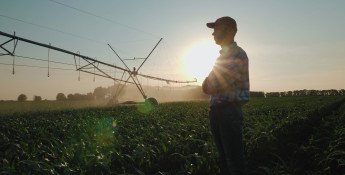By Hannah Becker on July 17, 2018
Are Nitrates in Our Water?

Clean water is something many of us take for granted. We turn on our faucets and assume the water drawn is safe to drink.
But not all Americans have this assurance. Recent events like the Flint, Mich. water crisis, have sparked discussion around the quality of our public water sources.
Are our water sources contaminated?
Is our community’s water safe to drink?
Can water with nitrates cause health issues?
Water - a natural resource that many (including myself) once took for granted - has emerged as a trending topic involving agriculture, conservation and government regulations.
In Midwestern states like Kansas, the potential presence of nitrates in water sources is one of the more hotly debated topics regarding water quality. But how many people know what nitrates are, how they get in their water and whether the water they are drinking really is safe?
What are nitrates and where do they come from?
Nitrates are a nitrogen product that is found in a variety of places - from leafy vegetables like spinach to industrial manufacturing components. For the chemistry folks out there, nitrate is simply the combination of one nitrogen and three oxygens (NO3-).
Nitrates have a variety of uses in our modern world, including fighting harmful bacteria, preserving food and even helping plants grow. Nitrates are an essential part of our ecosystem, and they serve many positive purposes.
While most nitrates are not damaging in small amounts, excessive levels of nitrate concentration have been cited as a possible contributing factor to environmental and health problems. Ingestion of water with excessive nitrate levels had previously been cited as the possible cause of infant methemoglobinemia (blue baby syndrome); however, additional studies found other contributing factors beyond that of nitrate presence.
What do nitrates have to do with agriculture?
Farmers and ranchers use nitrogen fertilizers to help crops grow. Nitrogen applied to crops is converted into nitrate with the help of soil bacteria and these nitrates encourage plant growth. Fertilizers help crops produce more food while consuming fewer natural resources, like water and land. Done properly, it’s a win-win-win situation for the farmer, our environment and the communities they feed.
If too much nitrogen fertilizer was applied, excessive nitrate has the potential to spill over into other areas like groundwater or runoff.
Did your mother ever tell you that you can have too much of a good thing?
Well, that’s what can happen with nitrates. In the right amount, nitrates are great for growing food, but if too much is applied, excessive nitrates have the potential to trickle into our water reserves.
What are farmers and ranchers doing to ensure our communities have clean water?
Many farmers and ranchers have adopted conservation-focused production techniques that allow them to grow more food with fewer resources.
Innovative farming practices like cover crops, genetically modified (GM) crops and no till farming help minimize the use of nitrogen-based fertilizers.
Farming equipment with precision technology assesses small areas of crops and customizes the amount of fertilizer used to meet the needs of each area, preventing excess application. It’s like “spoon-feeding” your plants just the right amount of supplement for their growth needs.
Additionally, farmers and ranchers are installing bioreactors - a filter system that can remove nitrates from water sources - and are working to establish more wetlands, also known as “nature’s nitrogen filter,” which help protect both our water supply and area wildlife.
How are nitrates affecting Kansas water quality?
But what about Kansas? How have nitrates impacted our clean water supply?
The Kansas Department of Health and Environment reports that 96 percent of Kansans have access to a clean public water supply that meets or exceeds all state and federal standards. This means the water is clean and safe to drink, free of all types of water contamination sources like arsenic and uranium.
If you’re like me, access to clean water is something we take for granted. It’s encouraging to learn how our farmers and ranchers are working to protect our community water supplies through conservation methods to ensure we have safe water for generations to come.





